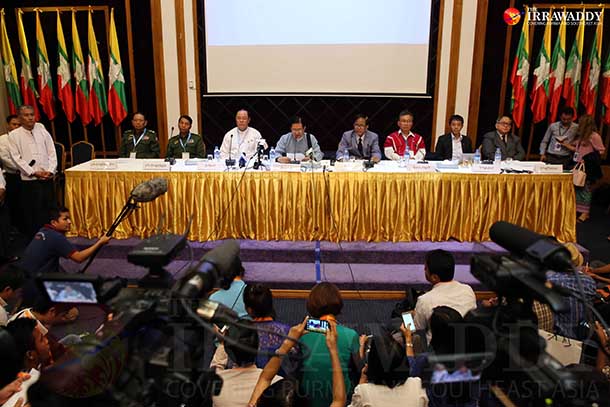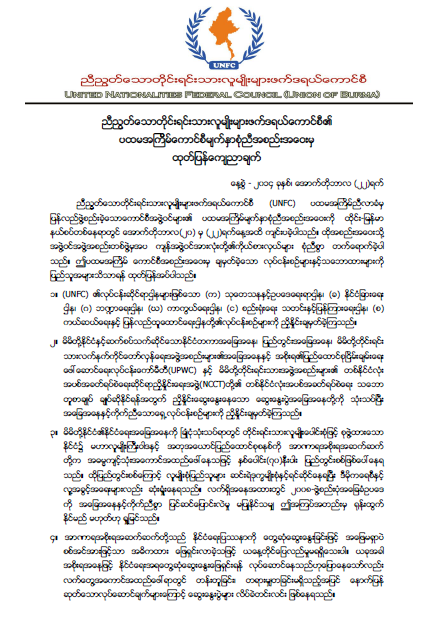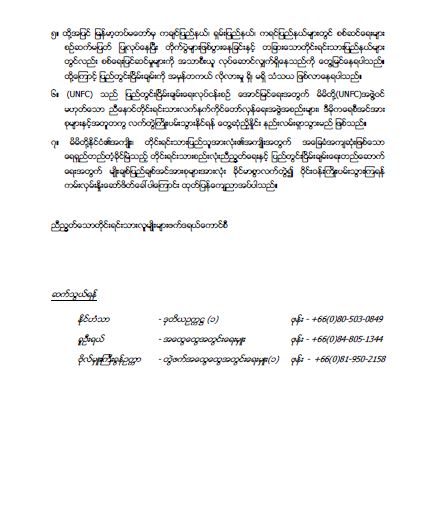Posts Tagged ‘Union Peace Working Committee’ (22 found)
UNFC on NCA and Internal Peace
Burma/Myanmar, after receiving independence on January 4, 1948 from the British colonialists in accordance with the Panlong Agreement, was accompanied by the civil war. Since the rulers of successive eras have tried to end the civil war, in disregard of the Panlong Agreement, they have not met with any success, up to this day, and people of all the nationalities have to continue to suffer the malicious caprices and dreadful consequences of war […]
• • •ျမန္မာ့တပ္မေတာ္စစ္ေၾကာင္း၏ ႏိုင္ထက္စီးနင္းထုိးေဖာက္တိုက္ခုိက္ေနမႈအေပၚ SSPP/SSA၏ သေဘာထားထုတ္ျပန္ခ်က္
သေဘာထားေၾကညာခ်က္ ျမန္မာဘာသာကို ဤေနရာတြင္ ေဒါင္းလုပ္ရယူႏိုင္ပါသည္။
• • •တစ္ႏုိင္ငံလံုးပစ္ခတ္တုိက္ခိုက္မႈရပ္စဲေရးသေဘာတူစာခ်ဳပ္ကို လက္မွတ္ေရးထိုးသည့္ တုိင္းရင္းသားလက္နက္ကုိင္ေတာ္လွန္ေရးအဖြဲ႔အစည္းမ်ား၏ သေဘာထားထုတ္ျပန္ခ်က္
၁။ ၂၀၁၁ ခုႏွစ္၊ ၾသဂုတ္လ (၁၈) ရက္ေန႔တြင္ ႏိုင္ငံေတာ္သမၼတ ဦးသိန္းစိန္မွ ၿငိမ္းခ်မ္းေရးေဆြးေႏြးရန္ ဖိတ္ေခၚခဲ့သည့္အခ်ိန္မွစ၍ မိမိတို႔ တိုင္းရင္းသားလက္နက္ကိုင္ေတာ္လွန္ေရးအဖဲြ႔အစည္းမ်ားသည္ ျပည္နယ္အဆင့္၊ ျပည္ေထာင္စုအဆင့္ အပစ္အခတ္ရပ္စဲေရးစာခ်ဳပ္ (Bilateral Agreement) မ်ားကို ႏွစ္ဖက္လက္မွတ္ေရးထိုးႏိုင္ခဲ့ၾကပါသည္ […]
• • •The Nationwide Ceasefire Agreement between the Government of the Republic of the Union of Myanmar and the Ethnic Armed Organizations
This Nationwide Ceasefire Agreement, between the Government of the Republic of the Union of Myanmar and the Ethnic Armed Organizations, recognizes, reinforces, and reaffirms all previous agreements between the Government of the Republic of the Union of Myanmar and the Ethnic Armed Organizations. This agreement also aims to secure an enduring peace based on the principles of dignity and justice, through an inclusive political dialogue process involving all relevant stakeholders […]
• • •Opening Remarks: The 9th Nationwide Ceasefire Agreement (NCA) Negotiations
ပထမဆံုးအေနနဲ႔ေျပာခ င္တာကေတာ့ အခုလက္ရ ိျပည္နယ္နဲ႔တုိင္းေဒသၾကီးအေတာ္မ် ားမ် ားမွ ာ ႀကံ်ဳေတြ႔ေန ရတဲ့ ေရေဘးဒုကၡေတြအတြက္ ကြ ်န္မတို႔အေနနဲ႔အင္မတန္မ စိတ္မေကာင္းျဖစ္ရျပီး ကယ္ဆယ္ေရးလုပ္ငန္း ေတြမွ ာလည္း အစုိးရအေနနဲ႔အေကာင္းဆံုးလုပ္ေဆာင္ေနတယ္လုိ႔ယံုၾကည္ပါတယ္။ ကြ ်န္မတို႔အေနနဲ႔ပံ့ပိုး ႏိုင္သည္မွ ာကိုလည္း တတ္အားသေရြ႕ပါ၀င္ပံ့ပိုးႏုိင္ဖို႔စိတ္ဆႏၵရွိပါတယ္ […]
• • •SD ႏွင့္ UPWC တုိ႔၏ တစ္ႏုိင္ငံလုံးအပစ္အခတ္ရပ္စဲေရးဆုိင္ရာ သေဘာတူစာခ်ဳပ္(မူၾကမ္း) (၈)ႀကိမ္ေျမာက္ညွိႏႈိင္းေဆြးေႏြးပြဲအေပၚ သေဘာထားထုတ္ျပန္ခ်က္
၁။ ၂၀၁၅ ခုႏွစ္၊ ဇူလုိင္လ (၂၂) ရက္ေန႔မွ (၂၄) ရက္ေန႔အထိ ရန္ကုန္ၿမဳိ႕ရွိ ျမန္မာႏုိင္ငံၿငိမ္းခ်မ္းေရးျပန္လည္ ထူေထာင္ေရးလုပ္ငန္းဗဟုိဌာနတြင္ က်င္းပျပဳလုပ္ခဲ့ေသာ တုိင္းရင္းသားလက္နက္ကုိင္ေတာ္လွန္ေရးအဖြဲ႔အစည္း မ်ား၏ တစ္ႏုိင္ငံလုံးအပစ္အခတ္ရပ္စဲေရးဆုိင္ရာ အဆင့္ျမင့္ညွိႏႈိင္းေရးကုိယ္စားလွယ္အဖြဲ႔ (SD) ႏွင့္ ျပည္ေထာင္စုၿငိမ္းခ်မ္းေရးေဖာ္ေဆာင္ေရးလုပ္ငန္းေကာ္မတီ (UPWC) တုိ႔၏ NCA စာခ်ဳပ္မူၾကမ္း (၈)ႀကိမ္ေျမာက္ ညွိႏႈိင္း ေဆြးေႏြးပြဲအေပၚ အျပဳသေဘာေဆာင္သည့္ေဆြးေႏြးပြဲတစ္ခုအျဖစ္ မွတ္ယူပါသည္ […]
• • •The Ethnic Armed Organizations’ Senior Delegation and the Union Peace Working Committee Complete Third Day of 8th Meeting for Conclusive Negotiations of the Nationwide Ceasefire Agreement
After the third day of negotiation, the EAOs’ Senior Delegation (SD) and the Union Peace Working Committee (UPWC) reached initial agreements on most of the provisions in the Nationwide Ceasefire Agreement (NCA) text. It was agreed that remaining provisions will be discussed in further negotiation […]
• • •Burma’s NCA Takes Another Chaotic Turn
 On 31 March, 2015, a signing ceremony took place in Rangoon involving members of the Nationwide Ceasefire Coordination Team (NCCT) and the Union Peace Working Committee (UPWC), and observed by President Thein Sein. Contrary to initial fervour around this event, this was not the actual signing of the nationwide ceasefire agreement (NCA). Rather, it was to agree in principle to a draft text that may be signed in the future. Many more difficult negotiations and hard compromises are still to happen. The next step, and this is not an insignificant rubber stamp of approval, is for the ethnic representatives to take this draft back to their respective organizations and alliances such as the United Nationalities Federal Council (UNFC), for discussions and decisions to be made as to whether this draft text of the NCA will be signed. This may well be made at a conference of ethnic armed groups (EAGs) towards the end of April.
On 31 March, 2015, a signing ceremony took place in Rangoon involving members of the Nationwide Ceasefire Coordination Team (NCCT) and the Union Peace Working Committee (UPWC), and observed by President Thein Sein. Contrary to initial fervour around this event, this was not the actual signing of the nationwide ceasefire agreement (NCA). Rather, it was to agree in principle to a draft text that may be signed in the future. Many more difficult negotiations and hard compromises are still to happen. The next step, and this is not an insignificant rubber stamp of approval, is for the ethnic representatives to take this draft back to their respective organizations and alliances such as the United Nationalities Federal Council (UNFC), for discussions and decisions to be made as to whether this draft text of the NCA will be signed. This may well be made at a conference of ethnic armed groups (EAGs) towards the end of April.
The instant headlines around this event were misleading, and international actors were indeed, misled. The UN Special Advisor for Myanmar, Vijay Nambiar, called the event “a historic and significant achievement” while the European Union said the agreement “bears testimony to the political courage and commitment of all sides to resolve grievances through dialogue rather than armed conflict.” Domestically, however, this praise was not reciprocated, as many Burmese political commentators and civil society criticized the signing on social media. This is hardly surprising because as of yet, key issues have been delayed and pushed back for later talks. These issues include a code of conduct, a monitoring mechanism for the ceasefire, interim arrangements before political dialogue begins, disarmament, demobilization, and reintegration (DDR), and security sector reform (SSR).
• • •Key Messages to World Leaders, International Governments and the UN Concerns and Requests Related to Humanitarian Situation in Kachin and Northern Shan States, Myanmar
The 25thASEAN Summit is commencing from 11 to 13 November 2014, hosted by Myanmar in its capital, Naypyi Taw. Most prominent world leaders are gathering and discussing important matters affecting the ASEAN countries and, inevitably, the interconnected global arena. On this occasion, Joint Strategy Team for Kachin Humanitarian Response would like to urge the world leaders, international governments and the UN to pay attention to the following concerns and take immediate actions to fulfill the requests. We firmly believe that the world leaders, international governments and the UN will strongly support the protection of dignity and rights of the internally displaced persons […]
• • •










 All posts
All posts